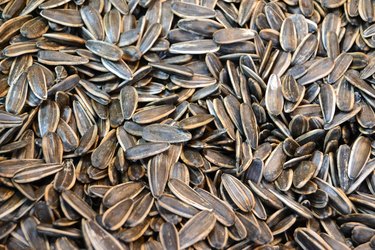
Nuts and seeds are popular and nutritious snacks eaten out of your hand or used as an ingredient in meals and baked goods. Some, like sunflower seeds, are usually roasted, so it's perfectly natural to wonder whether sunflower seeds can be eaten raw. The answer is "yes" – they're healthy and nutritious whether raw or cooked. You'll probably want to refrigerate the raw kind, though, less for food safety than for food quality reasons.
Sunflower Seeds Can Be Eaten Raw
Video of the Day
There are a few reasons to buy your sunflower seeds raw (usually just dried so they won't get moldy) rather than roasted. First and foremost, it means they're as versatile as they can be. You can eat them as is, add them to baked goods, grind them in a blender for sunflower seed butter, add them to pesto in place of pine nuts, or toast them and salt them for the times you want a savory snack.
Video of the Day
Some will also buy their sunflower seeds raw because they're keen to try a raw food/raw vegan diet. In this system, adherents stick to raw and unpasteurized foods (heated at most to temperatures of less than 118 degrees Fahrenheit). Their argument is that heating destroys nutrients and enzymes in the food, and that eating all raw all the time will make you healthier. There's not a lot of science to back those claims, but the same could be said for a lot of other diets.
Raw, Unrefrigerated Sunflower Seeds
There are two main reasons you might have reservations about eating sunflower seeds. One is that like any other raw food, it's possible for them to become contaminated with pathogens, like Listeria monocytogenes or the family of bacteria that causes salmonella. Cooking typically kills bacteria, though handling after they're cooked is a potential problem as well (a big recall in 2016 affected roasted seeds, not raw seeds).
A second issue is shelf life. Despite their high protein level, sunflower seeds aren't at risk of rapid spoilage like eggs and meat. They'll stay good for as long as two to three months out of the fridge if they're kept in a cool, dry, dark place. The longer they're left out, the greater the risk that they'll become rancid as their high levels of natural fat begin to oxidize and break down. This is a quality issue rather than a food safety concern; you won't eat enough to affect your health because they're just plain nasty. If you bag them in an airtight bag, they'll keep nicely for up to a year in your fridge or freezer.
Nutrition of Raw Sunflower Seeds
Now that you know sunflower seeds can be eaten raw, you may wonder why you'd bother. Well, like other nuts and seeds, raw sunflower seeds are a nutritional powerhouse. They pack 20.8 grams of protein into 100 grams of kernels, which is right up there with meats and poultry. Another 41.6 grams (almost half of their weight) comes in the form of healthy, unsaturated fats compared to just 4.46 grams of saturated fat.
They're also packed full of fiber, antioxidants, vitamins and minerals, which makes them a useful addition to any diet whether you're going raw, losing weight, or treating "diet" in the broader meaning as "everything you eat." Just remember to eat them quickly or pop them into your fridge so they won't go rancid before you use them.